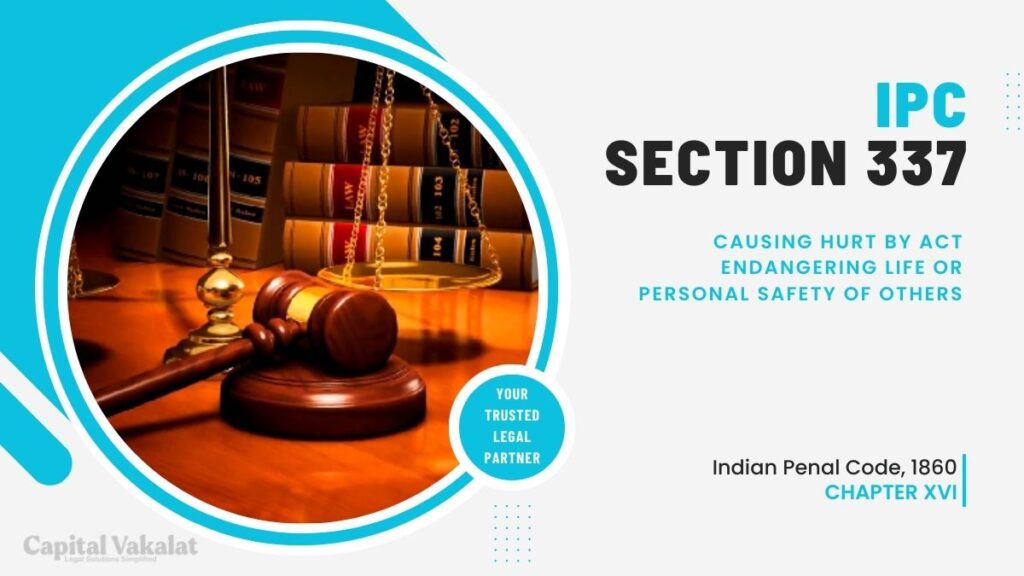Section 337 of the Indian Penal Code (IPC) addresses a critical aspect of criminal law, focusing on acts that endanger the life or personal safety of others.

This provision holds significant importance in maintaining public order and safety, making it imperative to delve into its intricacies and implications.
Understanding the Offense
In essence, Section 337 IPC deals with the intentional or reckless causing of hurt by acts that put the lives or personal safety of others in jeopardy. To establish an offense under this section, it is crucial to examine both the actus reus and mens rea components. The actus reus involves the physical act itself, while mens rea pertains to the mental state of the perpetrator, emphasizing the need for intent or knowledge.
Examples of Acts Endangering Life or Personal Safety
Illustrating the practical application of Section 337, numerous case studies highlight the diverse range of scenarios covered by the provision. From reckless driving leading to accidents to negligence in workplaces causing harm, the provision encompasses a broad spectrum of acts. Examining these examples provides insight into the gravity of offenses falling under Section 337 IPC.
Legal Consequences
Understanding the potential consequences of violating Section 337 is essential for both legal practitioners and the general public. The law prescribes varying degrees of punishment based on the severity of the harm caused. Judicial interpretations and precedents play a crucial role in shaping the outcomes of cases falling under this provision, adding a layer of complexity to its application.
Challenges in Prosecution
Prosecuting offenses under Section 337 comes with its set of challenges. Proving the requisite intent can be difficult, especially in cases where the act was reckless rather than intentional. Legal defenses, such as lack of foreseeability or intervening causes, further complicate matters. Navigating through these challenges requires a nuanced understanding of the legal landscape.
Preventive Measures
To address the issues covered by Section 337, a multifaceted approach involving public awareness and safety education is crucial. Raising awareness about the potential consequences of reckless actions can act as a deterrent. Additionally, integrating safety education into various spheres of life can contribute to a safer society.
Impact on Victims
The repercussions of acts endangering life or personal safety extend beyond physical harm. Victims often grapple with psychological trauma, necessitating a comprehensive support system. Understanding the holistic impact on individuals and communities sheds light on the urgency of preventing such offenses.
Recent Developments and Amendments
As society evolves, so does the legal landscape. Recent developments and amendments to Section 337 IPC reflect changing perspectives and priorities. Analyzing these changes provides a glimpse into the dynamic nature of criminal law and its responsiveness to societal needs.
Comparative Analysis
Contrasting Section 337 with related provisions in the IPC and exploring international perspectives on similar offenses offer valuable insights. Understanding how different jurisdictions approach acts endangering life provides a broader context for evaluating the effectiveness of Section 337.
Conclusion
In conclusion, Section 337 IPC serves as a crucial tool in maintaining public safety and order. Its nuanced application requires a careful balance between legal intricacies and societal well-being. By comprehensively addressing acts that endanger life or personal safety, the provision contributes to fostering a safer and more responsible society.
Frequently Asked Questions
What are the possible legal defenses against a charge under Section 337?
Legal defenses may include lack of foreseeability, intervening causes, or establishing that the act did not meet the elements of the offense.
How does the legal system determine the severity of punishment under Section 337?
The severity of punishment is often determined based on the extent of harm caused, ranging from minor injuries to life-threatening consequences.
Can Section 337 be applied to workplace incidents?
Yes, Section 337 can be invoked in cases of negligence or recklessness leading to harm in a workplace setting.
Are there any recent amendments to Section 337 IPC?
It’s advisable to check the latest legal updates for any amendments to Section 337, as the legal landscape is subject to change.